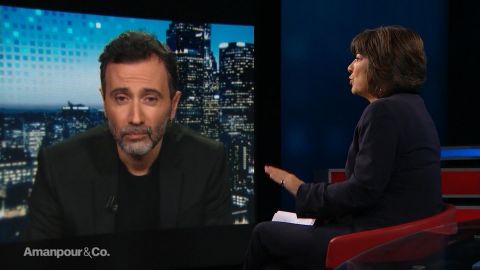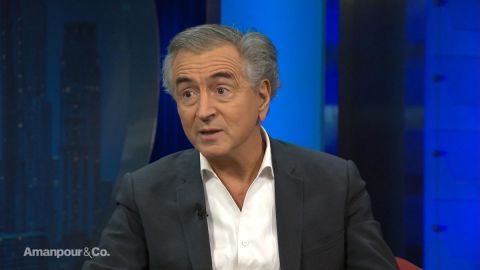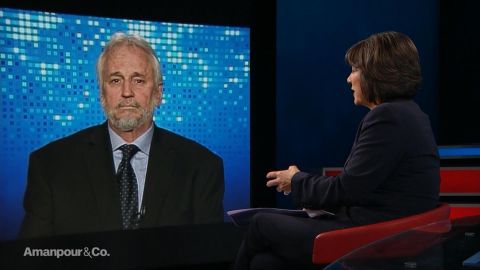Read Transcript EXPAND
CHRISTIANE AMANPOUR: Now, our next guest points to the situation in that country as one of the consequences of America firstism. In his new book “The Empire and the Five Kings”, the acclaimed French Philosopher Bernard-Henri Levy looks at what he calls America’s abdication from his traditional leadership role, a process that he claims did not begin with Donald Trump’s presidency and is not likely to end with him either. He sat down with our Hari Sreenivasan.
HARI SREENIVASAN: The book is called “The Empire and the Five Kings, America’s Abdication in the Fate of the World.” Who is the Empire? Who are the five kings?
BERNARD-HENRI LEVY, AUTHOR, THE EMPIRE AND THE FIVE KINGS: The empire is America and the five kings are the five enemies of the West and of the peoples, Turkey, Iran, Saudi Arabia, China, and Russia.
SREENIVASAN: And where is this fight taking place?
LEVY: On the world stage. You in America are, and we also European, are a little obsessed too much by Donald Trump, by the tweets of Donald Trump, by the wall of Donald Trump, by the anger of Donald Trump. In the meantime, the real fight is worldwide on all the planets. It is this war between these five kings, authoritarian state, totalitarian state, declaring war to their own people and to us on one side, and the democratic values on the other side. The serious picture is this one. The one I try to depict in this book, the relationship between retreating and abdicating the America and these five bad powers, authoritarian powers.
SREENIVASAN: You say that this abdication actually began well before Trump.
LEVY: Of course. When Barack Obama, for example, decided to draw a red line which Bashar al Assad was supposed not to be allowed to cross, chemical weapons use against his own people. And when he decided not to punish him, it was an abdication. It was the beginning of hurricane retreat. And even before, you had this sort of abdication. Donald Trump in a way is — I don’t say he’s nothing because he can do some harm but the deep story is much beneath. It’s a philosophical story. It is a story I try to tell in this book. What is the DNA of America? What is the real creed of America? What has been the role of America in the last century for the worst and for the best? And why there is strange and enigmatic withdrawal of America.
SREENIVASAN: The thing that Trump supporters or at least really enough Americans that had electoral college power in the United States agreed with was this idea of America first. That perhaps it is not our role to be the world’s police officer, to be intervening everywhere else, that we need to focus on our problems first. What’s wrong with that?
LEVY: If you think that America has to deal with its own business, you leave the battlefield, you leave the ground to Putin with all that is supposed, you let Putin rebuilding an empire which is his wish, you will and we will go back to the time of the Soviet Union. This is — if you decide to — that America is a fortress with walls and that you have to take shelter between the walls, we will have in front of us five new empires who will take some parts of the world, parts of market in the capitalist order who will make alliances with our allies of today. And this will mean a completely new map of the world where America will not be isolationist but isolated.
SREENIVASAN: If America was to take these steps and what you predict happens, if five other empires are able to ascend, doesn’t that take the target off of our backs as well? Doesn’t that start to address some of the global inequality that critics of America will say right now that we have too many of the resources, we squander too much? So what? Maybe China and Russia and Turkey should have more.
LEVY: I am ready to share the wealth but not with the oligarchs of Russia, not with the dictatorial of China, not to the family of Mr. Erdogan. With the people of Turkey, of course. With the people of the Arab countries who tempted an Arab Spring, of course. If the Democratic ideas prevailed in these five kingdoms, what I call the five kingdoms in my book, for sure but it is not the situation we have in front of us. So say it is, we shall not only enemies of us but we chop enemies of their people. Because never forget, those whom I call the five kings, they have one characteristic in common which is that they hate human rights, that they hate women, that they hate equality between women and men, that they hate free spirit, that they hate — look at MBS who is one of the five who pretended to be a reformer because he gave the driving license with women, I said in the book, you find it, that it is just a joke. He is the enemy of all the dissent humanistic values to which we are committed. And if we have a duty regarding Saudi Arabia, it is the duty to support the blood girls, the free press defenders, the small movements of women who represent and embody the future of this country, these are our friends.
SREENIVASAN: Even if the West has done all of these things to try to uplift people away from dictatorships and authoritarian regimes, to try to encourage this free spirit, why do we find a third of the world almost backsliding away from democracy?
LEVY: This is a philosophical question to which I try to give a philosophical reply. You have in the human spirit the two tendencies. You have in your mind society’s tendency to jungle and tendency to complexity and sophistication. And between the two, you have a fight to death. Sometimes sophistication, democracy, liberal values win. When you have a real leadership, when you have courageous defenders of moral values, sometimes the jungle prevails. And the simple ideas and the populism prevail. And it is true because we are in a time where populism is prevailing everywhere. There is a wind of populism of other planet. There is a tide of populism which is like muddy water all over the world.
SREENIVASAN: Have you stopped that wind, that tide with troops on the ground in all of these different countries?
LEVY: No, you stop this wind with other troops of the ground, the troops of spirit, the troops of ideas, the troops of intelligence which is the thing that these populists hate much. What they hate is ideas. What they hate is truth. What they hate is the dignity of spirits.
SREENIVASAN: You center the book around a population that you care deeply about, the Kurds. And that for you almost exemplify this entire global battle. Explain.
LEVY: It is true that the book is dedicated to them. And it is true that I decided to write this book when I was on the battlefield with my Kurdish brothers, brothers in spirit and brother in arms. Not because I combatted but I was embedded with them when they combatted ISIS. When it was a time to fight ISIS front to front with boots on the ground, the real boots were Kurdish boots. They were not American boots. They were not French boots. They were Kurdish boots so they embody bravery. Number two, the Kurds embody the Democratic Islam. They embody an Islam which is protecting the minorities, protecting and servicing the Christians and the Jews, who is protecting women, giving them the same rights including the right to fight by the way and to be on the battlefield, and so on. So for someone like me who has searched all of his life this democratic Islam, I search it in Bangladesh, I search it with Christiane Amanpour on the battlefield also in Bosnia. I search it during the Arab Spring in Libya. At last — I’m getting a little old but at last, I found it in blood and flesh embodied by the Kurds.
SREENIVASAN: So what happens with the U.S. announcement that it is planning to withdraw its troops?
LEVY: This is one of the numerous disasters of this administration. I’m sorry. It is a moral shame. You don’t abandon your allies. You don’t abandon your brothers in weapons and in arms. It is a political mistake, a huge one because — beware, the true barricade. Trump is rimming again of a wall along the Rio Grande. He had a human wall of fighters against ISIS. This second wall was so much more important than the wall on the Rio Grande and he decided to destroy it. He let the Iranians who were supposed to be — is our worst enemies to take over, backed of the house of the Kurdish territory. I saw some Abram tanks delivered by America, conducted by Iranian militiaman, and crushing the Kurds and killing them and occupying the territory. Then I understood that a whole new world was starting and was put in stage and in motion with new order, with new friends and enemies, and that I had to describe it.
SREENIVASAN: Look, there’s a huge chunk of the population that says we are right to pull out, we are right to withdraw from what are otherwise endless occupations.
LEVY: I’m sorry to say what I’m going to say. Please don’t blame me but those might have to pay the consequence for that because then you might have another terrorist attacks. You paid such a price against terrorism against Jihadism. You know what it means. It does not come from the sky if it came in away from the sky from September 11th. It came from countries. It comes from ideologies. It comes from base — military bases there somewhere. If you decide not to give about all this world of terror, then they will remember you and us, and they will have no mercy.
SREENIVASAN: Is there a new order emerging? Or I should say, what explains the rise of the yellow vests in France? Is that similar to what’s happening in the United States?
LEVY: It is similar to what happens with the Brexit in Great Britain. Similar to happen — to what happened in America between the Tea Party and the victory of Donald Trump. It is similar to what happened in Italy with Salvini. Yes, it is the same hatred of complexity, the same hatred of thought. In the past, we had some social movements in Europe and in America where the target of the social movement was to keep the excellence, to keep the great ideas, to keep the beauties, the museum, whatever, and to share them that with as many people as possible, to have — to permit everyone to have access to this world of excellence. OK. Now, no, the problem is not to give access to everyone to this world of excellence but to erase the world of excellence, to forbid great ideas, to forbid beauty. This is what means these war against elites which is the common flag of all this populist movement.
SREENIVASAN: There is a small sliver of optimism that you express in this. You know you have near the end of the book is where about these five kings in these five empires that are trying to be, where is their plan for civilization, where in today’s Iran, Turkey, China, Russia, and Arabia are the inspiring projects, the kingly works, the great books, the 21st century equivalents of the real and imaginary structures that were the glory of the ancient empires. And you also talk a little bit about small disruptions that can reverse everything, right. So is there still a possibility that these five empires do not climb any farther and faster than they are, that America can hold on?
LEVY: If we want, we can reverse. That’s true. If some engineers inside the big companies of Internet decide that they will not remain in the history of the civilization as those who destroyed the idea of truth, they can do it. If they decide that they will not remain as the guys who helped China to build some models of evaluation and watching and polices, they can prevent that. If some of them and all of us, if we want to remain inside his borders and even inside his borders to stop harassing his own Democrats, we can, not in one day, of course. This is an arm wrestling but we can do it. So yes, these five kingdoms who want to become empires did not succeed yet. They might not succeed. And yes, the West America which is so dull today, which seems to — so far from its old creed and from its old moxie can recover this moxie. And in this book, I humbly implore America to recover its lost moxie. Not only for the interest of the others but for the American self-interest. Because I know by history that each time America was faithful to its moxie and to its creed, it was great.
SREENIVASAN: Bernard-Henri Levy, thank you so much.
LEVY: Thank you.
About This Episode EXPAND
Christiane Amanpour speaks with historian Miguel Tinker Salas and novelist Isabel Allende about the crisis in Venezuela; and Talal Derki about his film “Of Fathers and Sons.” Hari Sreenivasan speaks with philosopher Bernard-Henri Levy about America’s abdication of its traditional leadership role.
LEARN MORE



